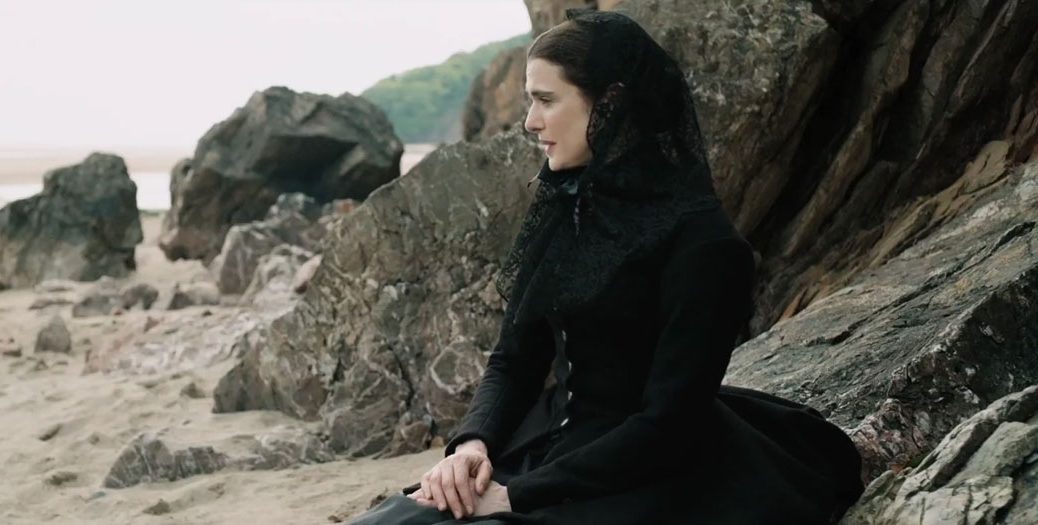A few weeks ago my sister-in-law and I were packing bookshelves and we tossed out several books, as one does while spring-cleaning. Amongst them was one by Daphne du Maurier, which I promptly saved from the pile. I’ve only read one of du Maurier’s books (Rebecca), but it’s one of my favourites. The movie adaptation – directed by Alfred Hitchcock – was infused with the same gothic eeriness as the book, and Hitchcock’s adaptation of her novelette The Birds is equally superb.
It was inevitable, then, that I would watch My Cousin Rachel, the latest movie based on a book by du Maurier. It’s not the first adaptation, but it was the first I watched. Nevertheless, I was somewhat familiar with the story beforehand, having read an interview about the movie with Rachel Weisz (who plays the Rachel of the title) some months ago.
Weisz is one of the most interesting actors working today, as well as one of the most versatile. The Mummy was probably the first time I ever watched her perform, and with My Cousin Rachel being the latest of her performances I’ve watched, I could not help but reflect that the two characters (never mind the movies) are worlds apart. She handles both with aplomb.
This is, of course, The Mummy from 1999, not the recent release. I think Weisz would be appalled at how the female characters were written in the latter, particularly considering the subtle yet strong exploration of female characterisation in My Cousin Rachel.
Ostensibly the story revolves around Philip, who suspects Rachel of murdering his cousin, who was also her husband. Like Rebecca (both book and movie) My Cousin Rachel is infused with the same gothic eeriness. Flickering shadows and tinkering piano keys heighten the sense of paranoia in Philip and the audience, as both wonder whether Rachel really is a killer or whether Philip is merely losing his mind.
Rachel comes across as calm, affable and gentle – winning the affection of Philip’s staff and his beloved dogs. It is when her emotions break out that her inner turmoil is revealed – a turmoil that reveals her frustration at playing the role society prescribes. If she veers from this role in even the slightest way, she is immediately regarded with suspicion.
Through Philip, and the fact that Rachel is only talked about and not seen in the first moments of the film, the audience becomes as suspicious of her as their ostensible protagonist does. Even when Rachel is physically brought into the picture, the suspicion lingers.
It is when Rachel’s pure, raw emotions break out that the audience begins to doubt both Philip’s and their own judgment. The movie’s conclusion, which I won’t reveal here, is an invitation to reflect on this judgment long after the credits roll.
The writing and directing (both by Roger Michell) finely balance this seesaw of doubt, given extra force through Weisz’s magnificent performance. I was somewhat dubious about the casting of Sam Claflin, who failed to impress me when I first watched him, in Pirates of the Caribbean: On Stranger Tides. Given that it was one of his first films, I was probably a bit unfair and he has definitely grown as an actor since.
His performance starts out as naïve and uncertain as his character, but develops into a well-wrought torment of paranoia. Cast as Philip’s godfather, Nick Kendall, is Iain Glen. Whether it’s Game of Thrones, Resident Evil, or Downton Abbey, I am always happy to watch him. He is somewhat typecast, but he distinguishes each character so well.
A nod also has to be made to Holliday Granger, who plays Nick’s daughter Louise. She gives credence to Stanislavski’s words: “There are no small parts, only small actors.” Like Rachel she is gentle and affable, but unlike Rachel she wants to fill the roles that Rachel does not, making her an interesting counterpoint to the title character. Through Louise, the audience’s suspicion and sympathy for Rachel are simultaneously reinforced.
I am loath to say that the film belongs to Rachel Weisz. She and Claflin carry the film in equal measure: her calm, almost lofty gentleness expertly foiled against his raging angst. Ultimately it is an ensemble effort. Michell handles the material expertly – instilling a feeling of romance and possibility with sweeping shots of gorgeous countryside, before deftly switching to a cloying paranoia in the moodier interior scenes. Every actor dutifully yet passionately plays their part, lending grace and gravitas to the enduring work of Daphne du Maurier.
